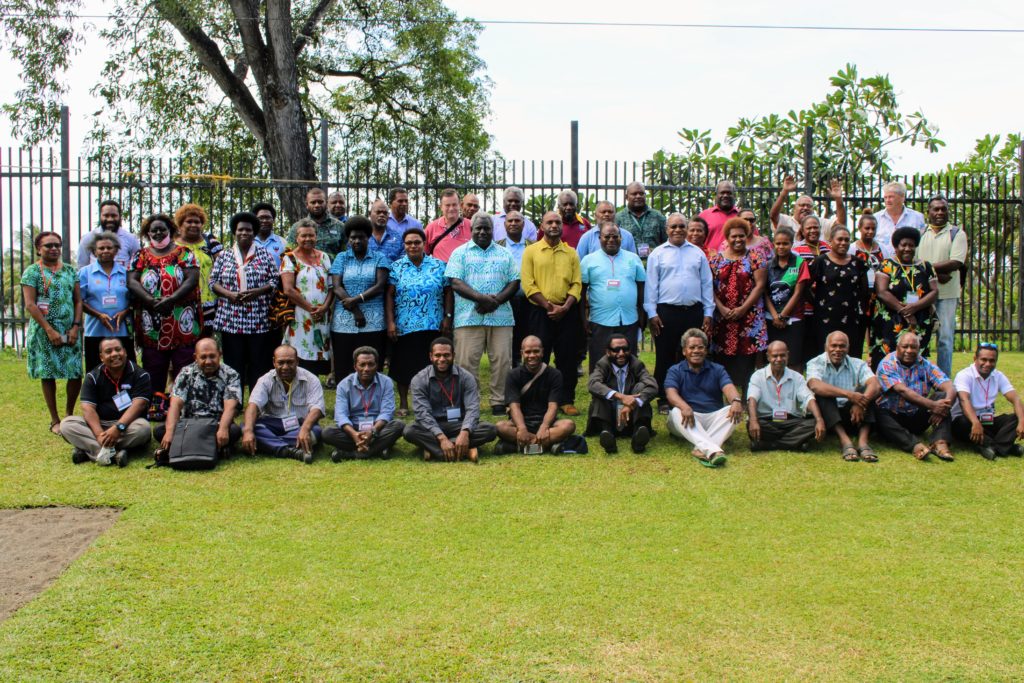Purpose
The core objectives of the Regional workshops were to inform stakeholders particularly the Higher Education Institutions (HEIs) of the Marape-Basil Government’s progress in implementing the Government’s commitment to reform, transform and unify the higher education system in Papua New Guinea. It was also an opportunity to receive feedback from the HEIs on relevant information concerning the five enabling key result areas namely: Budget; Governance; Human Resource; Programme Accreditation process for Private Training Provider Institutional; Digitalisation, and the; Registration under DHERST.
The reform is a direct result of the National Executive Council (NEC) Decision No: 54/1995 and No: 25/2017 to have all post-secondary institutions under the oversight of the Ministry for Higher Education, Research, Science and Technology.
The higher education transition and reform agenda is also captured in the Marape Manifesto and in the Social and Law & Order Sector (SLOS) Strategic Framework 2019-2022.
Why Reform?
For more than three decades, the higher education sector has been fragmented across at least eight different Ministries, with all post- secondary institutions coming under different regulatory and administrative frameworks. This has resulted in uneven quality and very often funding diverted to non-priority areas of the Government. Many ad-hoc post-secondary courses and programmes have been developed without proper quality assurance oversight or very little engagement with industry or adherence to industry standards. Consequently, the planned reform are therefore, necessary to empower institutions under DHERST regulatory oversight; strengthen funding arrangements for church agency institutions; support all post-secondary institutions in contributing to national skills priorities and a highly skilled and competitive workforce.
Why workshop?
The aim of the regional workshops was to engage with the stakeholders especially HEIs, Provincial Governments and Provincial Education representatives in explaining the reform outcomes and in understanding their role as important changes in higher education take place during the transitional period over the next 12 months and the reform period beyond. The workshop provided an opportunity for the Ministry and Department to demonstrate the Government’s strong commitment to the transition and reform agenda; and offered participants an opportunity to contribute constructively to the ongoing transformation of education quality.
Stakeholder feedback
Participants from the HEIs at the Governing Councils and Administration levels across the country, Provincial Government and Provincial Education representatives from the Region, expressed their strong support for the landmark changes occurring in the higher education sector.
Many acknowledged that the reforms are the most significant to occur in higher education in over three decades. Very constructive critiques and feedback were provided to DHERST that NGI Participants Momase Participants Southern Participants Highlands Participants conveyed momentum and support for the reforms, balanced with the need for ongoing consultation with individual institutions, the reliability of core government funding and ongoing capacity development support.

Way Forward/Next Steps
Following the Regional Workshops (Kokopo, NGI- 15-16 July, Madang, Momase 22-23 July, NCD, Southern 26-27 July, and Mt. Hagen, Highlands 29-30 July), DHERST will continue its engagement with on-going dialogue and collaboration to rollout the reform agenda with further Consultative workshops. The next phase of the reform is the review of the National Higher and Technical Education (NHTEP) 2015-2024 and the development of the National Skills Development Plan. The restructure of the Department will follow the policy reviews and Development.
The Ministry and Department of Higher Education, Research, Science and Technology will continue to engage with all stakeholders especially the higher education institutions in the country during the transition period.
Approved for Release
Hon. Wesley Ora Raminai, MP
Minister for Higher Education, Research, Science and Technology & Sports
(Member for Kagua Erave)

